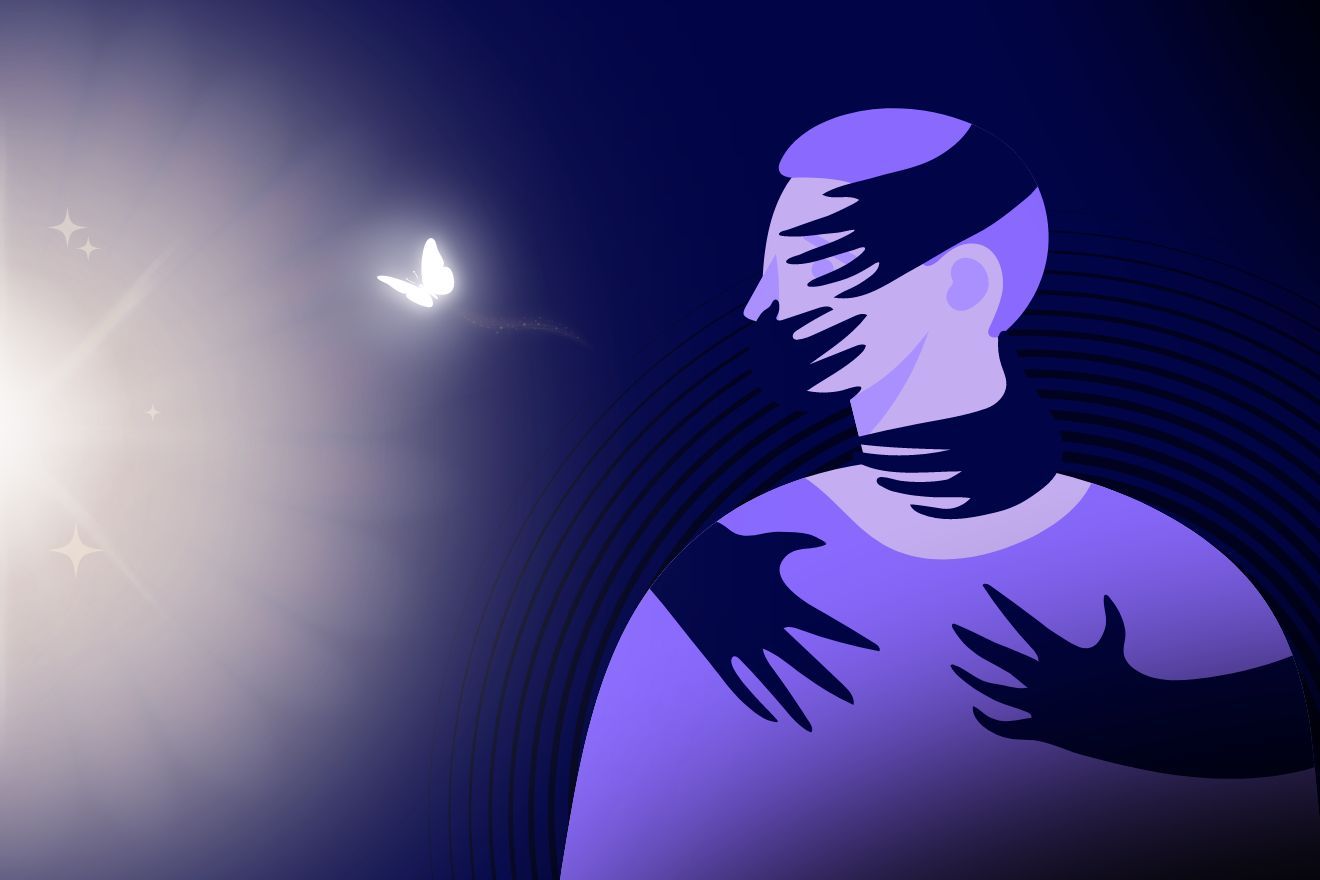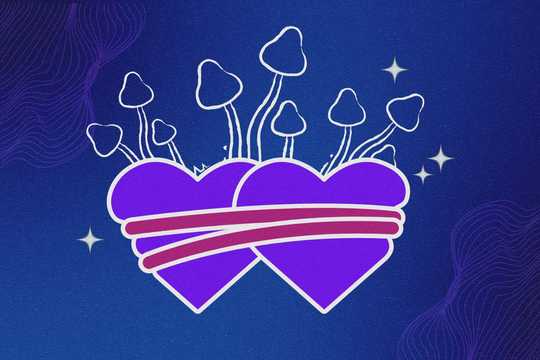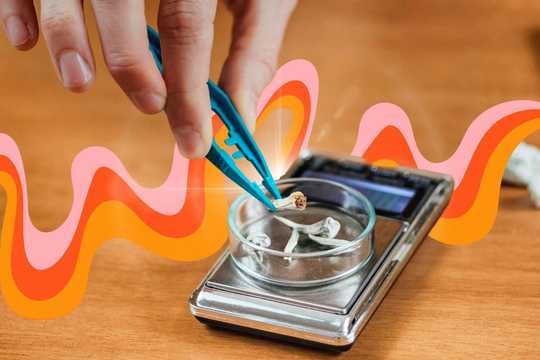As an advocate for the use of psychedelics in therapy, it’s never easy exploring and explaining the darker sides of this ancient practice. These medicines are under intense scrutiny. So, it is easy for unsavory actors to cherry-pick data or diagnosis and weaponize it against these plants. However, understanding and interpreting the darker elements of these therapies is how we create a safer, more accessible therapeutic environment for all patients. With this in mind, I’ve been exploring my darker history with psilocybin therapy. The profound changes I’ve encountered—especially in dealing with anxiety, depression, various triggers, and managing trauma—sit at the heart of my story. These generalized emotions, while deeply personal, might expose the transformative potential for many others.
Exploring psilocybin’s impact firsthand, I ventured beyond clinical trials, analyzing its influence on the struggles with PTSD, anxiety, and depression that I have experienced. It’s essential to emphasize that I approached this exploration recognizing the importance of professional guidance, legal access, and safety.
My experience may not mirror everyone’s. Even so, it offers a firsthand perspective outside the confines of clinical trials and is far removed from casual suggestions. I conducted these experiments in my childhood bedroom, as that is where life has currently brought me. Rooted in my professional experiences and interest in psychology and neurology, I may offer a unique glimpse into the potential of this widely cultivated plant in managing trauma.
As I conclude these personal experiments quite publicly, my focus transitions from merely sharing anecdotes to initiating a broader, informed discourse in the mental health community. Drawing from the nursing assessment model, I provide coping insights into my new management of anxiety, depression, and triggers. This satisfies my desire to be a helpful psych nurse, as I offer a distilled reflection on the common themes of managing trauma and traumatic recovery.
Recent Studies on Psilocybin’s Role in Managing Anxiety
Discoveries in psilocybin research offer proof of what I’ve personally experienced: the power of blending mindfulness with psychedelics to overcome our reliance on opiates and pharmaceuticals. A study from the University of Zurich validates this approach. It shows how when paired with mindfulness, psilocybin significantly improves well-being and empathy.
Equally compelling is research demonstrating how psilocybin and escitalopram can work harmoniously together. Escitalopram is a medication commonly prescribed. This synergy excites me. It offers a path away from sole dependence on conventional drugs towards a more integrated, holistic approach.
Further Resources for Trauma Healing with Psychedelic Therapy:
- Clinical Evidence Is Growing: Read About MDMA Therapy as a New PTSD Treatment Option
- Learn More About This Growing Recovery Option: Holistic Addiction Recovery With Psychedelics
- Find out How MDMA Therapy Benefits PTSD and Trauma
- Dance Your Way to Healing and Self-Discovery With Movement as a Psychedelic Integration Tool
Anxiety Transformation
My battle with anxiety used to be a never-ending cycle of high alert—always putting others’ comfort ahead of my own. This hyper-vigilance, meant to help, sometimes ended up frustrating those who wished for less meddling. Anxiety had a way of sneaking up on me, turning even basic activities, like a quick run to the store, into overwhelming hurdles; my heart accelerated every step of the way.
The Psychedelic Journey Begins
My journey into psilocybin has been a game-changer in rewriting my story with anxiety and managing trauma. Every session peels back another layer, hinting at the possibility of engaging with parts of my brain I never knew I could access. A major takeaway? The power of steering clear of the worry that comes from trying to predict the future.
For example, when I have an event to prepare for, the gut-brain connection no longer cripples my GI tract during the waiting period before the event. I now remember that ruminating reinforces negative feedback loops, robbing me of my present-waking life.
Sensory Perception and Cognitive Shifts
Additionally, my psilocybin experiments have fine-tuned my cognitive and sensory perceptions, revealing its soothing impact on anxiety. An unexpected yet pleasing discovery was a deeper bond with music and an improved ability to focus efficiently. These shifts haven’t only enriched my sensory experiences but have also carved out new theories on my attention deficit. I’ve learned to truly slow down, absorbing all of the moment.
For example, when someone is telling me something unfavorable, I now wait until they have exhausted the concept. Then, I calmly recite what I heard before delivering a neutral opinion. It’s also absolutely fine to remain silent if nothing can be helped in the matter. It’s not my responsibility to control the outcome but to maintain my composure. I could have never stated this before.
Establishing Boundaries for Wellness
Establishing personal boundaries has been crucial. Before my psilocybin journeys, I frequently yielded to others’ requests at the expense of my own health and personal time. Today, I understand the importance of putting my own needs first and making choices that align with my best interests, greatly diminishing my anxiety.
For example, living with your mother is probably the best way to test one’s ability to choose speaking up over physical discomfort. I now remind her I choose not to discuss politics when I am ingesting nutrition. We watch Family Feud during dinner now, ironically.
Psilocybin has offered me discernment on who truly aligns with my well-being. It helped me focus my energy there rather than playing the overpleasing, neurotic matriarch. These shifts mark a significant personality shift, showcasing the profound effect psilocybin can have on one’s behaviors when subtracting anxiety.
Psilocybin’s Anxiety Breakthroughs:
- Neuro-calming: Cultivated a focus on the present, easing worry and overwhelm.
- Neuro-sensory: Improved sensory perception and deepened absorption of experiences.
- Neuro-preserve: Facilitated the establishment of personal boundaries, promoting autonomy.
Recent Studies on Psilocybin’s Role in Managing Depression
A recent review, “Psychotherapy with Psilocybin for Depression” (2023), beautifully captures a traditional and holistic symbiotic shift. It highlights how therapy with psilocybin can treat major depressive disorder effectively—even in medication-resistant cases. Trial participants required just one or two doses and psychological support. I fully support this approach for its emphasis on integrating therapy. It reinforces the importance of taking a comprehensive approach, one that can expand our current psychiatric model.
Depression Transformation
Connecting depression with physical discomfort may seem unlikely, but my journey highlights a deep link. Once an overwhelming upper-body pressure, depression now feels more like a chemical cloak tied to imbalanced nutrition and inflammation. When that heaviness returns to my chest, triggering thoughts of betrayal, I pause to address underlying emotions. They are often rooted in unmet expectations from past events. Followed up with unhealthy comfort habits, like carelessly consuming high-sodium foods or cookies & cream flavored ice cream.
Understanding these episodes as subconscious-unresolved memories has shifted my automatic return to them. I now recognize these emotional burdens as temporary, similar to layers of clothing that can be removed. Dissecting the memory’s connection to a current hindrance aids this process, often lightening the load in just a few hours. Pursuits like nature walks, artistic projects, or journaling have evolved from mere coping mechanisms to vital components, gently revealing what I need to let go of. Writing, especially, has opened a door to self-honesty and clarity, surpassing conventional talk therapy.
Over the past four years, as I transitioned away from using antidepressants to manage my depression, I’ve uncovered analysis strategies during my psychedelic journeys. These experiences felt like being entrusted with secrets to maintaining calmness, exemplified by the exaggerated image of my mother’s worry over presidential court hearings.
This no longer annoys me; instead, it provides comic relief. It highlights her attempts to influence outcomes far beyond her control and reach. The display appears cartoonish, with her misery over an uncertain outcome dictating her mood each morning. Approaching information with more optimism and less despair has revealed to me the delicate process of managing trauma and healing from sadness.
Psilocybin’s Depression Breakthroughs:
- Physical Manifestations: Influenced by nutritional imbalance and inflammation, countered by self-reflection and prioritizing relief.
- Coping: Immediate engagement in nature, art, and writing, highlighting the significance of visible, spatial grounding in depression management.
- Transitioning: Years of transitioning off antidepressants to psychedelics, exploring consciousness and spirituality for balance.
Follow your Curiosity
Sign up to receive our free psychedelic courses, 45 page eBook, and special offers delivered to your inbox.Recent Studies on Psilocybin’s Role in Managing Trauma
Psilocybin promotes hippocampal neuroplasticity, acting as a catalyst for the brain’s repair crew. When trauma strikes, this crew faces a massive cleanup task. Psilocybin steps in, enhancing their efficiency and speeding up the rebuilding of damaged pathways. This not only encourages resilience but also aids in overcoming and managing trauma-related symptoms accompanying PTSD. Additionally, the study found that psilocybin facilitates fear extinction rapidly and sustainably by promoting hippocampal neuroplasticity in mice. These findings suggest psilocybin could be a valuable addition to exposure-based therapies for PTSD and other disorders characterized by difficulties in fear extinction.
Trigger Transformations
Returning to my childhood bedroom, the process felt like peeling back layers of old posters on the walls, each one uncovering a different memory I gladly forgot. This, like revealing hidden images of favorite 90s bands and actors, exposed failed fantasies tied to those memories long buried.
The Setting for Emotional Neurosurgery
Submerged in teen angst and the deeper unhealed scars of familial abuse, set and setting is severely important to consider before attempting emotional neurosurgery. The importance of environmental and emotional readiness must be approached first.
Gaining Emotional Bifocals
Now, with emotional bifocals, I’ve gained clarity that provides swift insights far beyond what mere recounting in a therapist’s office could offer. However, I imagine that even more information could have been extracted if I had a therapist to help unearth them. Confronting these and managing trauma where it first unfolded was both challenging and revelatory.
Unveiling and Confronting Triggers
I dismantled my identity and assigned labels. It reshaped how I handle triggers rooted in toxic family patterns, severing fears of masculine abandonment. During a hallucinatory vision on a larger dose, I vividly felt the emotions of a scenario where I could have easily been a father. This unique realization coincided with an early memory, such as being dropped off at daycare without a hug or kiss but rather a push and a shove by my father. I could visibly see myself telling my daycare teacher I didn’t know why I was crying.
Journaling as a Tool for Healing
These memories, which I had not recalled since they happened, allowed me to intellectualize the emotions I should have felt but was not allowed to express. Hence the life-long journaling—unknowingly a healthy coping mechanism. I appreciate discovering that I was helping myself with journaling all along, even though I never perceived it that way.
Overcoming Cultural and Personal Triggers
My previous discomfort surrounding assertive Latino men—a trigger directly linked to my fear of my father—underwent a significant evolution. Confronting this fear allowed me to address and heal from internalized biases. It became clear that our judgments or preferences often reflect our own insecurities. Embracing empathy and understanding, I relinquished misdirected discrimination, understanding that genuine healing begins with introspection.
Embracing Uncertainty and Letting Go of Control
Realizing that triggers often stem from our desire to control the uncontrollable is more about preventing a fantastical disastrous outcome. I’ve made a pact with myself not to plan or imagine anything more than two weeks into the future, as it seems to be an effective way to maintain ease with the fragile concept of time.
This shift in mindset, acknowledging that most outcomes are benign, has lessened my fixation on fear. My journey with psilocybin reshaped my cultural identity. It helped me manage triggers from others’ abrupt anger or expectations and reshape my previous perceptions.
Psilocybin’s Trauma Breakthroughs
- Root Revelations: Psilocybin immediately unveils buried childhood traumas, providing profound insights beyond traditional therapy.
- Empowerment: It emphasized the importance of set and setting, guiding emotional healing through preparedness and compassionate support.
- Emancipation: It facilitated liberation from triggering culturally-driven expectations, allowing self-acceptance and evolving perceptions of past experiences.
Renewal and Reflection
I’ve gained profound insights but, moreso, a reconstruction of my perceptions through psilocybin. Guided by psychiatric nursing principles, I’ve explored PTSD, anxiety, depression, and their underlying triggers. My hope is to shed light on possible outcomes to these struggles, offering personal details to those curious and facing similar challenges.
Psilocybin’s potential as a catalyst for mental and emotional change is striking. From navigating anxiety and depression to finding clarity, gratitude, and resilience, I’ve weathered repetitive internal storms. This extensive self-experimenting has completely reshaped my understanding of neurology and consciousness.
This journey is delicate, emphasizing the need for further intricate clinical trials. I envision a future where traditional and psychedelic therapies merge effortlessly. This will expand healing options and promote patient autonomy. In the past, worry was my constant companion, but I now effortlessly return to a baseline of contentment—a liberation from lifelong doom.
I advocate for mental health conversations to embrace consciousness awareness and energetic influences. Healing is difficult. It demands commitment and facing harsh truths with gratitude, which is absolutely easier with the aid of psychedelics and therapy. Recognizing the challenges of this journey is as vital as celebrating its benefits.






